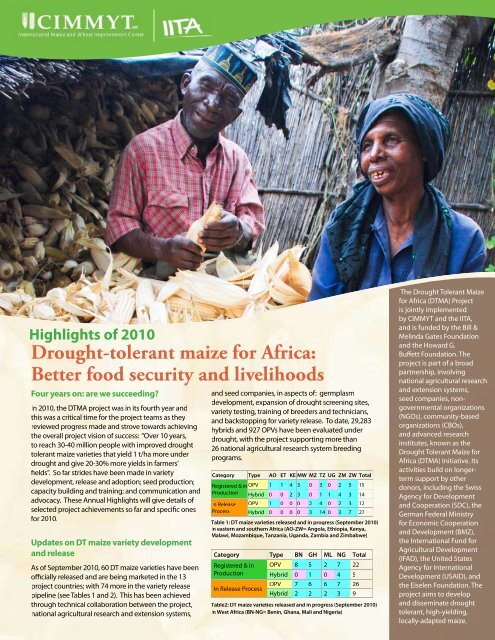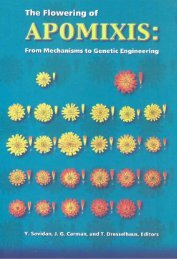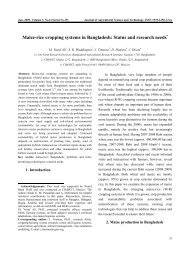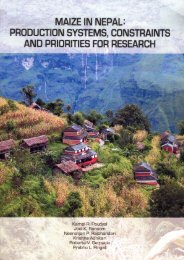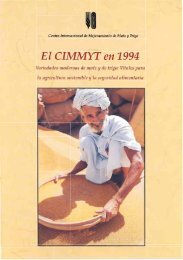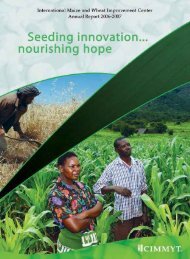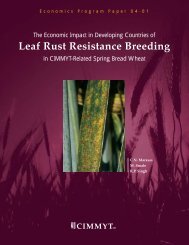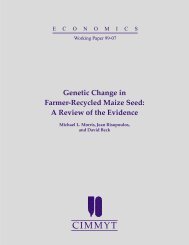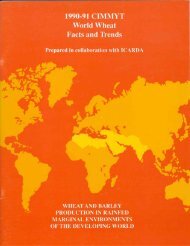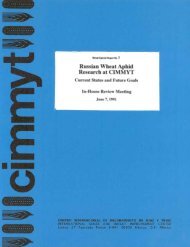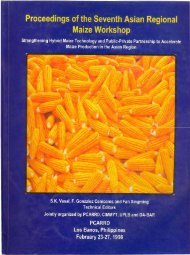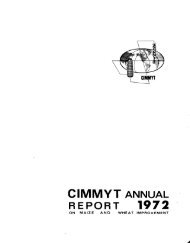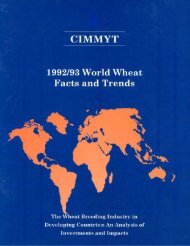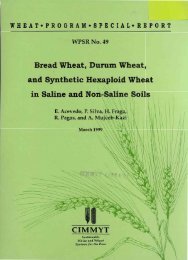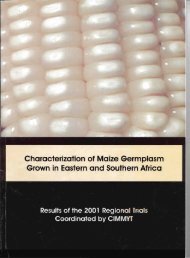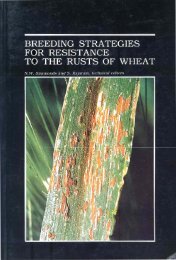Drought-tolerant maize for Africa: Better food security and ... - cimmyt
Drought-tolerant maize for Africa: Better food security and ... - cimmyt
Drought-tolerant maize for Africa: Better food security and ... - cimmyt
Create successful ePaper yourself
Turn your PDF publications into a flip-book with our unique Google optimized e-Paper software.
Highlights of 2010<br />
<strong>Drought</strong>-<strong>tolerant</strong> <strong>maize</strong> <strong>for</strong> <strong>Africa</strong>:<br />
<strong>Better</strong> <strong>food</strong> <strong>security</strong> <strong>and</strong> livelihoods<br />
Four years on: are we succeeding?<br />
In 2010, the DTMA project was in its fourth year <strong>and</strong><br />
this was a critical time <strong>for</strong> the project teams as they<br />
reviewed progress made <strong>and</strong> strove towards achieving<br />
the overall project vision of success: “Over 10 years,<br />
to reach 30-40 million people with improved drought<br />
<strong>tolerant</strong> <strong>maize</strong> varieties that yield 1 t/ha more under<br />
drought <strong>and</strong> give 20-30% more yields in farmers’<br />
fields”. So far strides have been made in variety<br />
development, release <strong>and</strong> adoption; seed production;<br />
capacity building <strong>and</strong> training; <strong>and</strong> communication <strong>and</strong><br />
advocacy. These Annual Highlights will give details of<br />
selected project achievements so far <strong>and</strong> specific ones<br />
<strong>for</strong> 2010.<br />
Updates on DT <strong>maize</strong> variety development<br />
<strong>and</strong> release<br />
As of September 2010, 60 DT <strong>maize</strong> varieties have been<br />
officially released <strong>and</strong> are being marketed in the 13<br />
project countries; with 74 more in the variety release<br />
pipeline (see Tables 1 <strong>and</strong> 2). This has been achieved<br />
through technical collaboration between the project,<br />
national agricultural research <strong>and</strong> extension systems,<br />
<strong>and</strong> seed companies, in aspects of: germplasm<br />
development, expansion of drought screening sites,<br />
variety testing, training of breeders <strong>and</strong> technicians,<br />
<strong>and</strong> backstopping <strong>for</strong> variety release. To date, 29,283<br />
hybrids <strong>and</strong> 927 OPVs have been evaluated under<br />
drought, with the project supporting more than<br />
26 national agricultural research system breeding<br />
programs.<br />
Category Type AO ET KE MW MZ TZ UG ZM ZW Total<br />
Registered & in<br />
OPV 1 1 4 3 0 3 0 2 5 19<br />
Production<br />
Hybrid 0 0 2 3 0 1 1 4 3 14<br />
In Release<br />
Process<br />
OPV 1 0 0 0 2 4 0 2 3 12<br />
Hybrid 0 0 0 0 3 14 0 3 7 27<br />
Table 1: DT <strong>maize</strong> varieties released <strong>and</strong> in progress (September 2010)<br />
in eastern <strong>and</strong> southern <strong>Africa</strong> (AO-ZW= Angola, Ethiopia, Kenya,<br />
Malawi, Mozambique, Tanzania, Ug<strong>and</strong>a, Zambia <strong>and</strong> Zimbabwe)<br />
Category Type BN GH ML NG Total<br />
Registered & in<br />
Production<br />
In Release Process<br />
OPV 8 5 2 7 22<br />
Hybrid 0 1 0 4 5<br />
OPV 7 6 6 7 26<br />
Hybrid 2 2 2 3 9<br />
Table2: DT <strong>maize</strong> varieties released <strong>and</strong> in progress (September 2010)<br />
in West <strong>Africa</strong> (BN-NG= Benin, Ghana, Mali <strong>and</strong> Nigeria)<br />
The <strong>Drought</strong> Tolerant Maize<br />
<strong>for</strong> <strong>Africa</strong> (DTMA) Project<br />
is jointly implemented<br />
by CIMMYT <strong>and</strong> the IITA,<br />
<strong>and</strong> is funded by the Bill &<br />
Melinda Gates Foundation<br />
<strong>and</strong> the Howard G.<br />
Buffett Foundation. The<br />
project is part of a broad<br />
partnership, involving<br />
national agricultural research<br />
<strong>and</strong> extension systems,<br />
seed companies, nongovernmental<br />
organizations<br />
(NGOs), community-based<br />
organizations (CBOs),<br />
<strong>and</strong> advanced research<br />
institutes, known as the<br />
<strong>Drought</strong> Tolerant Maize <strong>for</strong><br />
<strong>Africa</strong> (DTMA) Initiative. Its<br />
activities build on longerterm<br />
support by other<br />
donors, including the Swiss<br />
Agency <strong>for</strong> Development<br />
<strong>and</strong> Cooperation (SDC), the<br />
German Federal Ministry<br />
<strong>for</strong> Economic Cooperation<br />
<strong>and</strong> Development (BMZ),<br />
the International Fund <strong>for</strong><br />
Agricultural Development<br />
(IFAD), the United States<br />
Agency <strong>for</strong> International<br />
Development (USAID), <strong>and</strong><br />
the Eiselen Foundation. The<br />
project aims to develop<br />
<strong>and</strong> disseminate drought<br />
<strong>tolerant</strong>, high-yielding,<br />
locally-adapted <strong>maize</strong>.
While this is encouraging, more progress will be made through<br />
shortening the time <strong>for</strong> variety release <strong>and</strong> the harmonization of<br />
regional seed regulations <strong>and</strong> laws <strong>for</strong> promoting testing, release<br />
<strong>and</strong> marketing of seed of new varieties across borders. Other<br />
ef<strong>for</strong>ts such as developing the local grain markets will encourage<br />
farmers to adopt new DT <strong>maize</strong> varieties, as farmers will be assured<br />
of a market <strong>for</strong> their produce. In the coming year, the DTMA<br />
project will continue working with governments, partners <strong>and</strong><br />
other stakeholders such as non-governmental <strong>and</strong> communitybased<br />
organizations in the project countries towards realization of<br />
this goal.<br />
Ghana releases four new DT <strong>maize</strong> varieties<br />
On 15 March 2010, four new drought <strong>tolerant</strong> quality protein<br />
<strong>maize</strong> varieties were officially released in Ghana. The varieties<br />
were collaboratively developed by the International Institute of<br />
Tropical Agriculture (IITA) <strong>and</strong> Ghana’s Council <strong>for</strong> Scientific <strong>and</strong><br />
Industrial Research (CSIR)-Crops Research Institute (CRI) <strong>and</strong> the<br />
Savanna Agricultural Research Institute (SARI). Manfred Ewool,<br />
<strong>maize</strong> breeder from CRI led the CSIR team. Ghanaian farmers<br />
have welcomed these new varieties which are expected to<br />
boost <strong>maize</strong> production <strong>and</strong> have even given them local names<br />
– denoting their importance in Ghanaian society <strong>and</strong> based on<br />
their characteristics. They are CSIR-Omankwa (‘gives life’), CSIR-<br />
Aburohemaa (‘Queen mother of <strong>maize</strong>’), CSIR-Abontem (‘extra<br />
early <strong>maize</strong>’) <strong>and</strong> CSIR-Enii Pibi (‘father’s child’). Says Ewool, “The<br />
extra early DT varieties will help bridge the ‘hunger gap’ during the<br />
planting season. Farmers could plant early, harvest <strong>and</strong> sell or use<br />
it as <strong>food</strong> be<strong>for</strong>e the main season begins.” On average they harvest<br />
between 1.5 <strong>and</strong> 2 tons/ha, <strong>and</strong> when drought hits this drops to<br />
0.5 tons/ha, especially where local varieties are planted. With the<br />
new DT <strong>maize</strong> varieties released, farmers could harvest between<br />
1 <strong>and</strong> 2 tons/ha under drought. The yellow DT variety – CSIR-<br />
Abontem – would contribute to national savings of US$ 1.8 million<br />
annually spent on importing yellow <strong>maize</strong> <strong>for</strong> the poultry industry.<br />
Bamusi Stambuli, from Balaka, estimated he will save US$330<br />
over 12 months from growing ZM 309. This year, Stambuli’s <strong>maize</strong><br />
yields of this variety were nearly twice those of other popular local<br />
varieties. “I will now be able to feed my family <strong>for</strong> 12 months,” said<br />
Stambuli, who has seven children <strong>and</strong> five gr<strong>and</strong>children.<br />
ZM 309 <strong>and</strong> ZM 523 are providing a niche market <strong>for</strong> improved<br />
open-pollinated variety (OPV) seed. This year, Seed Co Malawi<br />
<strong>and</strong> Demeter Seeds increased their seed production to target the<br />
drought-hit areas. Seed Co’s aimed to produce 165 tons of ZM 309<br />
<strong>and</strong> 210 tons of ZM 523, while Demeter Seeds aimed to produce<br />
520 tons of ZM 523. Demeter is also producing ZM 621, ZM 623<br />
<strong>and</strong> ZM 721 – to increase farmers’ DT <strong>maize</strong> options.<br />
“Farmers are now asking <strong>for</strong> these varieties by name. We hope<br />
that from seeing the per<strong>for</strong>mance of ZM 309, farmers will<br />
be encouraged to start buying certified <strong>maize</strong> seed to boost<br />
production,” says Dellings Phiri, Managing Director of Seed Co<br />
Malawi.<br />
More: http://www.<strong>cimmyt</strong>.org/en/about-us/media-resources/<br />
newsletter/715-<strong>maize</strong>-farmers-<strong>and</strong>-seed-businesses-changingwith-the-times-in-malawi<br />
Exp<strong>and</strong>ing drought screening capacity: new facility<br />
launched in Nanga, Zambia<br />
Nanga, a national irrigation research station in Zambia, became<br />
the newest DTMA project drought screening site on 29 September<br />
2010. The site represents significant investments by both CIMMYT<br />
(through the DTMA Project) <strong>and</strong> the Zambian Agricultural<br />
Research Institute (ZARI) <strong>and</strong> was selected because it has well<br />
defined dry <strong>and</strong> rainy seasons, uni<strong>for</strong>m soils, <strong>and</strong> a reliable<br />
irrigation source. The site was inaugurated by Zambia’s Deputy<br />
Minister of Agriculture, Enoch Embebe, <strong>and</strong> the participants<br />
included farmers, local leaders, students, the surrounding<br />
community <strong>and</strong> CIMMYT staff – Boddupalli Prasanna, Global<br />
Maize Program Director; Wilfred Mwangi, Associate Director <strong>and</strong><br />
DTMA Project Leader; <strong>and</strong> <strong>maize</strong> breeders John MacRobert <strong>and</strong><br />
Amsal Tarekegne. During the event, participants experienced<br />
firsth<strong>and</strong> the site’s managed drought screening activities by<br />
viewing ongoing CIMMYT <strong>and</strong> ZARI drought trials. The site will<br />
enhance the DTMA Project’s ef<strong>for</strong>ts of developing DT <strong>maize</strong> in<br />
southern <strong>Africa</strong>.<br />
CSIR-Omankwa (‘gives life’)<br />
CSIR-Abontem (‘extra early <strong>maize</strong>’)<br />
Identifying the best bet DT varieties in Malawi<br />
In Malawi, the DTMA project works closely with the Ministry of<br />
Agriculture <strong>and</strong> Food Security, the Chitedze Research Station, Seed<br />
Co, Demeter Seeds <strong>and</strong> non-governmental organizations. During<br />
the last main cropping season (December 2009-March 2010), a<br />
severe drought hit these areas. However, two new varieties – ZM<br />
523 <strong>and</strong> ZM 309 (jointly developed by CIMMYT <strong>and</strong> the Chitedze<br />
Research Station) – were noticeably more drought <strong>tolerant</strong> than<br />
other varieties grown. Farmers who grew the DT varieties were<br />
able to harvest a crop while their neighbors who grew other<br />
varieties suffered crop losses.<br />
Ghana passes a new seed law<br />
On June 4, 2010, Ghana’s parliament passed the “Plants <strong>and</strong><br />
Fertilizer Act of Ghana”, which will have positive impacts <strong>for</strong> the<br />
country’s seed industry, <strong>and</strong> the work of the DTMA project in<br />
Ghana <strong>and</strong> the greater West <strong>Africa</strong>n region. The new Act is in<br />
three parts: the Seed Law, Fertilizer Law <strong>and</strong> Plant Protection Law.<br />
Through ef<strong>for</strong>ts coordinated by the Alliance <strong>for</strong> a Green Revolution<br />
in <strong>Africa</strong> (AGRA) <strong>and</strong> Ghana’s Millennium Development Authority<br />
(MiDA), various stakeholders were engaged in reviewing the new<br />
law. AGRA’s Policy Officer, Dr Augustine Langyintuo, led these<br />
ef<strong>for</strong>ts <strong>and</strong> was co-author of a recent DTMA project report on<br />
the West <strong>Africa</strong>n seed sector that provided useful insights in the<br />
revision of the Act, which repeals all previous seed, fertilizers <strong>and</strong><br />
pesticide laws. With the new laws, the country’s private seed sector<br />
will be more involved in foundation seed production, previously<br />
a reserve of the state-run Ghana Grains Legumes Development<br />
Board. Expected benefits include better access by seed companies
to foundation seed (seed that is used to produce the seed which<br />
is finally sold to farmers), <strong>and</strong> a more vibrant <strong>and</strong> streamlined<br />
seed sector, with these benefits spilling over to Ghana’s<br />
neighbors. Nigeria, Mali <strong>and</strong> Benin are the region’s other DTMA<br />
project countries. More in<strong>for</strong>mation: Dr Augustine Langyintuo,<br />
Alangyintuo@agra-alliance.org.<br />
Projected pay-offs <strong>for</strong> <strong>Africa</strong>’s farmers <strong>and</strong><br />
consumers from drought <strong>tolerant</strong> <strong>maize</strong><br />
More than 4 million people in sub-Saharan <strong>Africa</strong> st<strong>and</strong> to escape<br />
poverty <strong>and</strong> several millions more will improve their livelihoods,<br />
if all current improved <strong>maize</strong> varieties were replaced with<br />
drought <strong>tolerant</strong> ones developed by the DTMA project between<br />
20007 <strong>and</strong> 2016.<br />
This is one of the broad aims<br />
of the project <strong>and</strong> one of the<br />
key findings of a recent study<br />
conducted in the 13 project<br />
countries (Angola, Benin,<br />
Ethiopia, Ghana, Kenya,<br />
Malawi, Mali, Mozambique,<br />
Nigeria, Tanzania, Ug<strong>and</strong>a,<br />
Zambia, <strong>and</strong> Zimbabwe).<br />
The study - Potential impact<br />
of investments in drought<br />
<strong>tolerant</strong> <strong>maize</strong> in <strong>Africa</strong> –<br />
was led by CIMMYT socioeconomist<br />
Roberto La<br />
Rovere, <strong>and</strong> evaluates the<br />
potential impacts of the<br />
DTMA project.<br />
Using geographic in<strong>for</strong>mation system data, data on the<br />
probability of failed crop seasons (PFS), yield data from breeders,<br />
projected <strong>maize</strong> adoption rates mainly from seed experts, <strong>and</strong><br />
poverty data from socio-economists, the study’s authors found<br />
that farmers <strong>and</strong> consumers will benefit from higher yields <strong>and</strong><br />
from reduced season-to-season yield fluctuations, through<br />
the adoption by farmers of improved, drought <strong>tolerant</strong> <strong>maize</strong><br />
varieties. At the most likely rates of adoption, based on several<br />
recent studies <strong>and</strong> expert advice, <strong>and</strong> assuming conservative<br />
yield improvements, drought <strong>tolerant</strong> <strong>maize</strong> can generate US$<br />
0.53 billion from increased <strong>maize</strong> grain harvests <strong>and</strong> reduced<br />
risk over the study period. Assuming more optimistic yield<br />
gains, the economic benefit is nearly US$ 0.88 billion in project<br />
countries. The most striking economic <strong>and</strong> poverty benefits will<br />
accrue in Nigeria, Kenya, <strong>and</strong> Malawi, based on the amounts<br />
of <strong>maize</strong> sown in these countries, the importance of <strong>maize</strong> in<br />
local diets <strong>and</strong> livelihoods, <strong>and</strong> their historical levels of adoption<br />
of improved <strong>maize</strong>. In comparison, the benefits will be more<br />
modest in Angola <strong>and</strong> Mozambique <strong>and</strong> moderate in Ug<strong>and</strong>a<br />
<strong>and</strong> Mali.<br />
The drought <strong>tolerant</strong> varieties considered are the product of<br />
conventional breeding—that is, they are not transgenic. It is<br />
expected that farmers who adopt these varieties will continue to<br />
grow them beyond 2016 – making the returns on investments<br />
to the project’s work even more significant. This report is be<br />
available on the DTMA website (http://dtma.<strong>cimmyt</strong>.org)<br />
DTMA project at FARA <strong>Africa</strong>n Agricultural Science<br />
Week<br />
As part of advocacy ef<strong>for</strong>ts the DTMA project was represented<br />
at the Forum <strong>for</strong> Agricultural Research in <strong>Africa</strong> (FARA)<br />
<strong>Africa</strong>n Agricultural Science Week during 19-23 July 2010,<br />
in Ouagadougou, Burkina Faso. FARA is a key umbrella<br />
organization <strong>for</strong> major agricultural stakeholders in <strong>Africa</strong>.<br />
The event tackled key issues affecting <strong>Africa</strong>n agricultural<br />
research <strong>and</strong> development in the face of climate change <strong>and</strong><br />
the global financial crisis, <strong>and</strong> was attended by more than<br />
700 representatives, among them ministers of agriculture,<br />
researchers from international <strong>and</strong> national agricultural centers,<br />
policymakers, development partners, <strong>and</strong> partners from farmer<br />
<strong>and</strong> non-governmental organizations. The work of the DTMA<br />
project was found to be highly relevant as it addresses climate<br />
change.<br />
The project was showcased as part of CIMMYT initiatives in<br />
<strong>Africa</strong> under the ‘Market Place’ side event <strong>and</strong> the DTMA project’s<br />
progress in developing <strong>and</strong> disseminating new drought <strong>tolerant</strong><br />
<strong>maize</strong> varieties was shown through poster displays, reports<br />
<strong>and</strong> leaflets; with a focus on getting seed into farmers’ h<strong>and</strong>s<br />
(through the Innovation Learning Plat<strong>for</strong>m in Malawi) <strong>and</strong><br />
the ‘crop insurance’ element of DT <strong>maize</strong>. Among the visitors<br />
was Rw<strong>and</strong>an Minister of Agriculture, Dr Agnes Kalibata, who<br />
was interested in DT <strong>maize</strong> technology <strong>and</strong> how it could be<br />
introduced <strong>and</strong> scaled up in her country. Other visitors to<br />
the exhibition booth were also interested in the DT <strong>maize</strong><br />
technology, how to obtain seed, <strong>and</strong> community-based seed<br />
production; <strong>and</strong> project publications – the seed sector study<br />
<strong>and</strong> policy briefs, <strong>and</strong> the seed business management in <strong>Africa</strong><br />
manual. French translations of some of the materials proved<br />
useful <strong>and</strong> popular.<br />
More in<strong>for</strong>mation: www.fara-africa.org <strong>and</strong> http://www.<br />
faraweek2010.blogspot.com/
Promoting the DTMA Project through radio <strong>and</strong> video<br />
DTMA project to begin radio extension partnership<br />
More than 70% of smallholders in sub-Saharan <strong>Africa</strong> own a radio,<br />
<strong>and</strong> radio represents a very effective means of reaching farmers with<br />
agricultural extension messages. However, only 7% of radio airtime<br />
is devoted to agriculture, with a huge potential <strong>for</strong> more. In July,<br />
the Bill & Melinda Gates Foundation <strong>and</strong> Farmer Voice Radio (FVR)<br />
organized a workshop <strong>for</strong> 26 representatives from 10 foundation<br />
grants across 17 organizations, including the DTMA project, to explore<br />
opportunities available <strong>for</strong> maximizing airtime with radio stations.<br />
FVR is a consortium of radio broadcasters, agricultural experts, <strong>and</strong><br />
farmers, established to provide a variety of agriculture-related radio<br />
programming, <strong>and</strong> serve as a megaphone <strong>for</strong> two-way extension<br />
priorities from content providers. FVR is planning a series of radio<br />
programs whose focus is to be on the farmer, with content developed<br />
collaboratively by experts, farmers <strong>and</strong> radio extension officers.<br />
The DTMA project will participate through generating content, <strong>and</strong><br />
providing expert interviews. The work will initially be in Kenya <strong>and</strong><br />
Malawi, <strong>and</strong> move out to Ghana, Mali, Tanzania <strong>and</strong> Ug<strong>and</strong>a.<br />
“<strong>Drought</strong>-<strong>tolerant</strong> <strong>maize</strong> - high yielding <strong>and</strong> af<strong>for</strong>dable”<br />
In September <strong>and</strong> October 2010, Wilfred Mwangi, DTMA Project<br />
Leader, <strong>and</strong> Dellings Phiri, Managing Director, Seed Co Malawi were<br />
interviewed by radio journalists in Kenya <strong>and</strong> Malawi on the emerging<br />
importance of drought <strong>tolerant</strong> open pollinated <strong>maize</strong> varieties,<br />
especially <strong>for</strong> smallholder farmers. Following is a short introduction to<br />
the interview:<br />
For subsistence <strong>and</strong> smallholder farmers, buying improved <strong>maize</strong> seed,<br />
such as hybrid varieties, is a gamble. If rains fail, they can lose not only<br />
their crop, but also the savings they have invested in the seed. In response,<br />
the <strong>Drought</strong> Tolerant Maize <strong>for</strong> <strong>Africa</strong> (DTMA) project is developing open<br />
pollinated varieties of <strong>maize</strong> which have shorter maturity <strong>and</strong> offer<br />
high yields. They are also cheaper <strong>for</strong> seed companies to multiply, <strong>and</strong><br />
there<strong>for</strong>e can be sold at a more af<strong>for</strong>dable price. Wilfred Mwangi of DTMA<br />
<strong>and</strong> Dellings Phiri of Seed Co Malawi discuss the new varieties, <strong>and</strong> their<br />
growing popularity.<br />
The interview is available at http://www.agfax.net/radio/detail.<br />
php?i=380<br />
“Maize is Life”<br />
On 16 October 2010, during the World Food Prize, Jeff Raikes, the CEO<br />
of the Bill & Melinda Gates Foundation screened a short film on the<br />
DTMA Project’s work in Tanzania <strong>and</strong> Malawi. The film was produced<br />
by the Gates Foundation.<br />
Following is a short introduction to the film: For Sharifa Numbi, a<br />
smallholder farmer in Tanzania, <strong>maize</strong> is life. Maize nourishes her family<br />
at every meal. It’s also her main source of income, giving her money to<br />
send her children to school, visit the doctor, <strong>and</strong> put a roof over her head.<br />
The video is available at http://www.gatesfoundation.org/<br />
agriculturaldevelopment/Pages/<strong>maize</strong>-is-life-video.aspx<br />
Partners par excellence: Ethiopia, Ghana , Kenya,<br />
Nigeria, Zambia, <strong>and</strong> Zimbabwe win DTMA awards<br />
To promote excellence <strong>and</strong> team work among national DTMA<br />
partners, the project awards the best teams in DT <strong>maize</strong> breeding <strong>and</strong><br />
technology dissemination.<br />
In eastern <strong>Africa</strong>, Ethiopia won both DTMA excellence awards – in<br />
breeding <strong>and</strong> variety dissemination - further raising the bar in<br />
excellence st<strong>and</strong>ards. In West <strong>Africa</strong>, Ghana won the 2009 breeding<br />
award while Nigeria won the variety dissemination award. These<br />
regional awards were presented in February <strong>and</strong> March 2010,<br />
respectively.<br />
In 2010, Kenya responded to Ethiopia’s challenge <strong>and</strong> won the eastern<br />
<strong>Africa</strong>n best technology dissemination team award with Ethiopia<br />
winning the best breeding team award <strong>for</strong> the fourth time running. In<br />
southern <strong>Africa</strong>, Zimbabwe won the best breeding team award, while<br />
Zambia won the best technology dissemination team award. We<br />
congratulate all the teams <strong>for</strong> their concerted ef<strong>for</strong>ts to develop <strong>and</strong><br />
provide improved drought <strong>tolerant</strong> varieties to farmers in their region!<br />
Training news<br />
Empowering tomorrow’s <strong>maize</strong> breeders<br />
As part of nurturing the next generation of <strong>maize</strong> breeders, the<br />
DTMA project has so far trained more than 350 <strong>maize</strong> technicians<br />
<strong>and</strong> scientists through short-term in country courses, <strong>and</strong> technically<br />
supervised <strong>and</strong> backstopped 22 Msc, <strong>and</strong> 13 PhD students<br />
researching on drought in <strong>maize</strong>. Specific training initiatives in 2010<br />
are highlighted below.<br />
Kenya <strong>and</strong> Nigeria<br />
Between 17 <strong>and</strong> 21 May, 2010, the Kenya Agricultural Research<br />
Institute (KARI) <strong>and</strong> the DTMA project organized a training workshop<br />
<strong>for</strong> 35 <strong>maize</strong> technicians, in Embu, Kenya. Course participants came<br />
from five KARI stations, seed companies, NGOs, <strong>and</strong> the CIMMYT field<br />
station in Kiboko. A similar training was conducted at IITA in Nigeria<br />
from 19-24July 2010, with participants from Ghana, Nigeria, Mali <strong>and</strong><br />
Benin. The trainees got an opportunity to upgrade their skills <strong>and</strong><br />
knowledge of field trial management, variety testing, registration, <strong>and</strong><br />
release. Topics covered included breeding <strong>for</strong> abiotic <strong>and</strong> biotic stress,<br />
management of trials <strong>and</strong> nurseries, hybrid development, on-farm<br />
variety testing, seed production, variety descriptors, variety release<br />
<strong>and</strong> registration, <strong>and</strong> use of the CIMMYT Fieldbook (software <strong>for</strong><br />
pedigree <strong>and</strong> data management). Course presentations were in the<br />
<strong>for</strong>m of lectures, demonstrations, <strong>and</strong> practical sessions.<br />
Christine Khalamua from KARI-Kakamega said, “I have especially learnt<br />
a lot about r<strong>and</strong>omization of trials.”<br />
Zimbabwe<br />
A training course on <strong>maize</strong> breeding was held in Harare, Zimbabwe,<br />
during 16-31 August 2010 to share new breeding methods <strong>and</strong><br />
technologies, with early-career <strong>maize</strong> breeders interested in <strong>maize</strong><br />
improvement <strong>for</strong> stress environments. The course, was jointly<br />
organized by the DTMA project <strong>and</strong> the Department of Research <strong>and</strong><br />
Specialist Services (DR&SS) of the Zimbabwe Ministry of Agriculture,<br />
<strong>and</strong> attracted 57 participants from the private sector <strong>and</strong> various<br />
national agricultural research systems (NARS) from almost all of the<br />
DTMA countries. The course covered aspects of: breeding <strong>maize</strong> with<br />
desirable traits (drought tolerance, disease <strong>and</strong> insect resistance, <strong>and</strong><br />
good yield); <strong>and</strong> the use of: marker-assisted breeding <strong>and</strong> transgenics<br />
in <strong>maize</strong> improvement; advanced in<strong>for</strong>mation technology tools in<br />
<strong>maize</strong> breeding; <strong>and</strong> doubled haploid technology to accelerate the<br />
development of <strong>maize</strong> inbred lines. Although focusing on <strong>maize</strong>, the<br />
course also covered general aspects of choosing desirable parents<br />
<strong>for</strong> breeding programs. The course participants observed the <strong>maize</strong>breeding<br />
process firsth<strong>and</strong> when they visited the on-going CIMMYT<br />
<strong>and</strong> DR&SS drought screening trials at breeding nurseries in Chiredzi,<br />
Chisumbanje, <strong>and</strong> Mzarabani.<br />
For more in<strong>for</strong>mation<br />
http://dtma.<strong>cimmyt</strong>.org<br />
Project Leader: w.mwangi@cgiar.org


